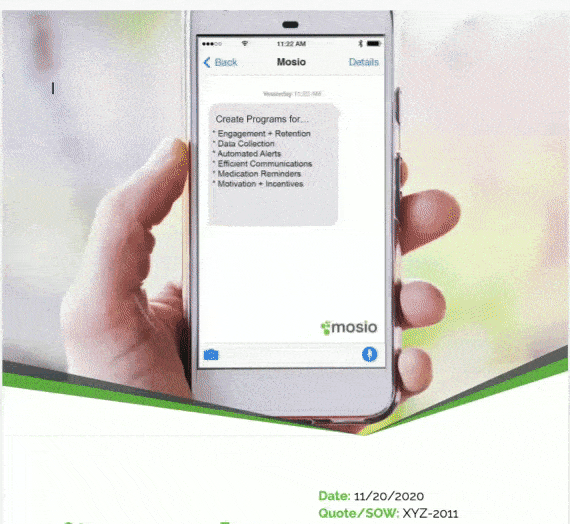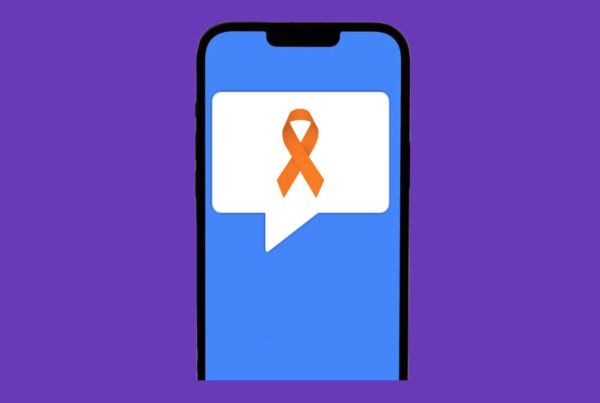7 Ways to Increase Clinical Trial Subject Engagement with Text Messaging
Identify a specific aspect of your clinical trial that, if enhanced, would have a positive impact on the overall study, including the resulting data. One vital element for the success of a trial is the consistent engagement of study participants. Patient-centric studies are particularly significant, as engaged patients lead to more accurate results and successful studies.
To improve patient engagement and create a patient-centered trial, text messaging software can be seamlessly integrated into the study. This software is an ideal tool as it does not require any apps or smartphones, just a mobile device capable of SMS messaging.
Maximize the potential of SMS software, which is the most commonly used feature on mobile devices, to increase patient engagement in clinical trials. Here are seven essential ways in which SMS text messaging can be used to enhance patient engagement in a clinical trial:
1. Send Appointment Reminders to Help Ensure Site Visit Compliance
To reduce the likelihood of missed appointments or provide patients with a convenient way to reschedule, consider using an automated text message system to remind participants of their appointment ahead of their site visit. These messages can be customized to meet your specific needs. For example, you can send a general reminder a week prior to the appointment, or a final reminder 24 hours before the scheduled visit. Study subjects can respond to these messages by simply replying with a “yes” or “no” (Y/N) to confirm their attendance.
Some of our clients even use text messaging to remind patients of upcoming phone calls, increasing the likelihood that they will answer when the phone rings. Given that 23% of phone calls go directly to voicemail, sending a text message beforehand can serve as a useful “heads up” that a call is incoming.
2. Dosing and Medication Adherence Reminders
You can use text messages to remind patients about the timing and dosage of their study-specific medications. By allowing patients to respond to these messages, you can increase patient engagement and ensure that they are complying with the protocol. This feature also promotes adherence to the study protocol.
By using a single system to cover all these functions, you can integrate medication reminders with other engagement and patient compliance solutions. This system can include a medication reminder app alongside a suite of other tools to improve patient engagement and compliance.
3. Automated Coordinator Check-ins
Regular check-ins with study staff can be a valuable way to keep patients engaged and motivated throughout a clinical trial. One effective method for doing so is by sending monthly or quarterly automated text messages that can appear to come from the patient’s study coordinator. These check-in messages can serve multiple purposes. First and foremost, they help to keep patients accountable by reminding them of their commitment to the study and encouraging them to stay on track with the protocol.
Additionally, check-in messages can help to increase patients’ attention to protocol by providing them with personalized guidance and support. For example, study staff may use check-in messages to remind patients of upcoming appointments, provide instructions for medication adherence, or offer suggestions for managing any side effects they may be experiencing. Finally, check-in messages can help to engage patients in the trial process by providing them with a sense of connection to the study staff and the overall research community. By creating a more personalized and supportive study environment, check-in messages can help to improve patient retention and overall study outcomes. Overall, the use of programed check-in messages sent by study staff can be a valuable way to keep patients engaged and motivated throughout a clinical trial.
4. Use Text Messaging as a Motivational or Appreciation Tool
Subject motivation and appreciation are key components in ensuring a successful clinical trial. Subjects who feel valued and appreciated are more likely to remain engaged and motivated throughout the study, leading to better overall outcomes. One effective way to achieve this is by using text messaging as a motivational or appreciation tool.
By scheduling regular text messages that acknowledge subjects’ hard work and dedication, study coordinators can create a more positive and supportive study environment. For example, sending messages of encouragement or congratulations for reaching milestones or complying with study protocol can help to boost patient morale and motivation. Additionally, messages that express gratitude for patients’ participation can help to foster a sense of appreciation and recognition for their contributions. Overall, using text messaging as a motivational or appreciation tool can be a simple yet powerful way to support patients throughout a clinical trial and help to ensure its success.
5. Collect Patient-Reported Outcomes (ePRO)
By sending text messages with links to questions (or links launching a mobile app if your study requires it) about symptoms, treatment side effects, or other relevant information, researchers can gather real-time data directly from study participants. This approach has several advantages over traditional paper-based methods of data collection, including increased convenience and reduced potential for errors. Additionally, text messaging can be used to send reminders to patients to complete ePRO surveys, improving data accuracy and reducing study dropouts. Furthermore, the use of text messaging for ePRO can help to improve the timeliness of data collection, allowing researchers to more quickly identify trends or changes in patient symptoms or experiences. Overall, text messaging can offer a more efficient and effective way to collect ePRO in clinical trials, leading to better study outcomes and more meaningful data.
6. Offer Study-Related Resources
Researchers can use text messaging to send links to educational materials, such as articles or videos, that provide subjects with more information about the study and its goals. Additionally, researchers can send links to online support groups or forums where subjects can connect with others who are participating in the study or share their experiences. By providing these resources, researchers can help to ensure that subjects feel more engaged and supported throughout the study process. This, in turn, can lead to increased subject retention and better study outcomes. Furthermore, by using text messaging to deliver these resources, researchers can reach subjects wherever they are and on their preferred device, increasing the likelihood that they will engage with the resources provided.
7. Use Simple Gamification as an Aid to Ensure Long-term Retention
The use of gamification in clinical trials has been on the rise in recent years. By integrating gamification techniques into the trial process, researchers can keep patients engaged, motivated, and more likely to stick to the study protocol. Text messaging can be a powerful tool for incorporating gamification into clinical trials. For example, researchers can use text messages to notify patients when they have reached a new stage of the trial or have “leveled-up”. This can be particularly effective for longer trials where patients may start to lose interest or motivation over time.
Text messaging can also be used to provide patients with rewards or incentives for their commitment and adherence to the study protocol. By making the trial process more interactive and enjoyable, patients are more likely to stay engaged and motivated, leading to better study outcomes. The use of text messaging for gamification is also relatively simple and easy to implement, making it an accessible option for study staff and patients alike. Overall, the integration of gamification techniques through text messaging can be a powerful way to improve patient engagement and study outcomes in clinical trials.
Bonus: Two additional ways texting can be used to improve study subject engagement in clinical trials
A. Deliver Incentives or Stipends
We understand this can be a somewhat tricky road to navigate in clinical trials. Even it not monetary, the key takeaway is that texting can be used to keep in regular contact, automatically, with study subjects, helping to keep them engaged in your study. Whether tied in with gamification or just a method of increasing patient engagement, text messaging allows you to deliver incentives directly to your patient. Receiving a gift code or notification that a reward has been sent via SMS messaging is both efficient and exciting. The majority of people have their mobile device within arms reach nearly 24/7, so rewards and incentives are literally at your patient’s fingertips. Gift codes from Amazon or other vendors can be sent automatically after a desired action (site visit, survey completion, etc), or some systems can be integrated with pre-paid visa or “clincard” technologies for a seamless process.
B. Send Patient Satisfaction Surveys via SMS
It’s important to periodically check in with your patients, patient-centricity starts by collecting feedback from patients themselves about what will make the clinical trial process better. Sending text-based surveys gives you a glimpse into your patient’s firsthand experiences in your trial. Many of whom genuinely want to share what’s working well and what can be improved upon, so take note! Staff can also utilize survey results to help spot patients struggling with adherence and pinpoint those who might need extra support, in real-time. Survey results can be combined with trigger notifications to send out a specific SMS message when certain conditions are met.
Maximizing on patient engagement means increased compliance, retention and subject satisfaction…All of which leads to the most important reason we pursue clinical research: more accurate results for the future of healthcare. Text messaging software can be a great tool to incorporate if you’re serious about improving upon patient centered studies.






